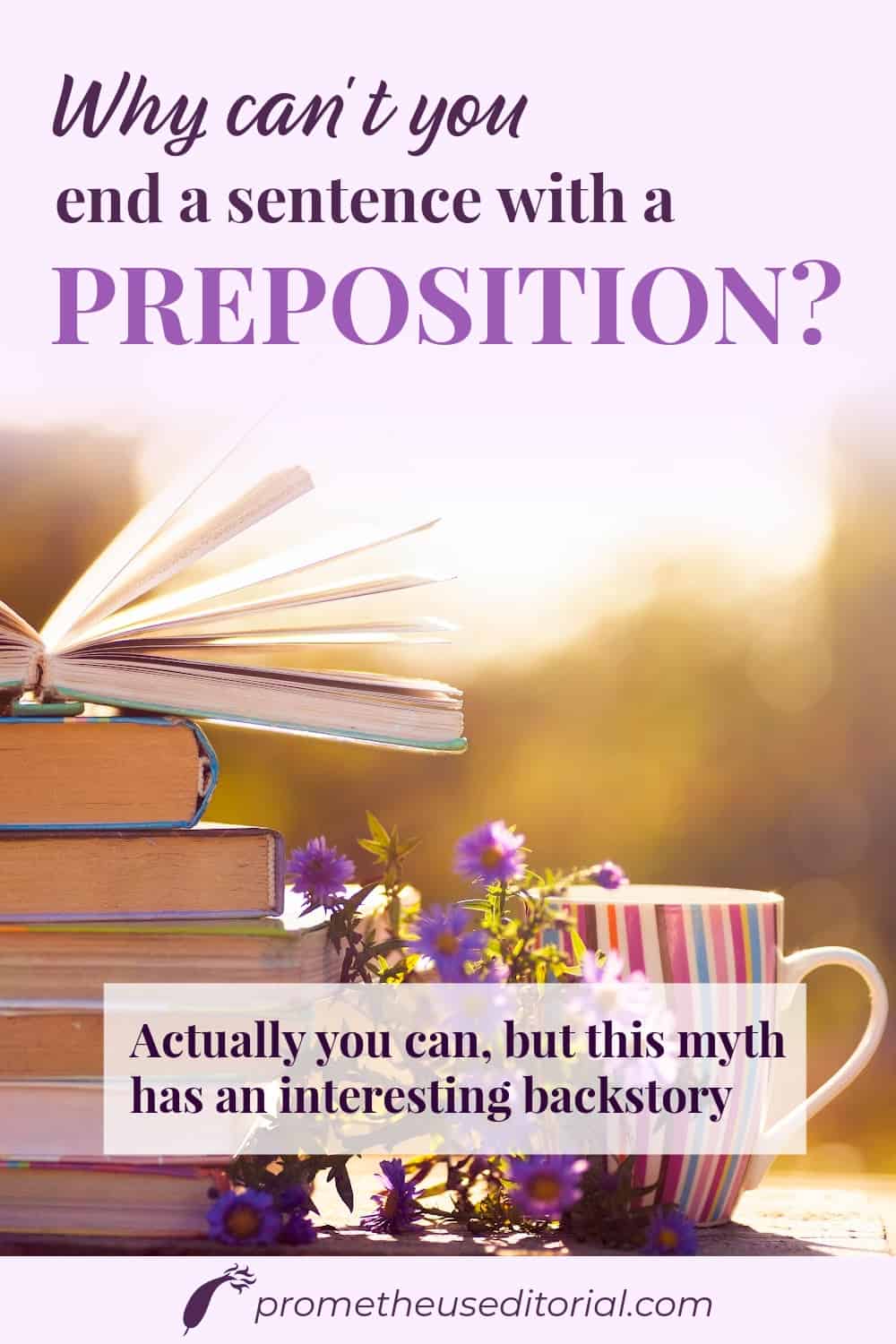Can You End a Sentence with a Preposition?
Some people claim that you cannot end a sentence with a preposition, but this idea is not supported by the way we use language or by our reference books.
A rule does not have intrinsic value just by virtue of the fact that it was once written down in a grammar book, for two main reasons:
First, our language is constantly changing and plenty of rules that were correct in the past are no longer relevant. This is why style manuals and dictionaries get updated every few years—because language changes and they need to stay current.
And second, grammar books reflect, rather than invent, how our language is used. The rules don’t originate from books. They come from the way we use grammar in real life, and reference books exist to explain them in a clear and concrete way so that we can all understand each other more easily. If a grammar “rule” is not attested by the way language is used and provides no advantage (such as removing ambiguity), it is no longer necessary and reference books will remove it or risk becoming out of touch with the English language as it currently exists.
Where does this myth come from?
The idea that you can’t end a sentence with a preposition is such a pervasive grammar myth that many people, especially in older generations, were taught about it in school. But that doesn’t mean that it was ever a legitimate rule.
In fact, this is a transplant from the Latin Language. Bryan Garner, a leading authority on the English Language, tells us in Garner’s Modern English Usage that in Latin, “a preposition was the one word that a writer could not end a sentence with.”1 But what does this have to do with English?
In the academic circles of medieval and early modern Europe, Latin was much more widely taught and studied than it is today and many saw Latin’s grammar as superior to that of other languages. As someone who studied Latin in college, I can see where they get that idea from.
Latin as a whole is very consistent about following its grammar rules, and there are very few irregular forms compared to any other language that I have studied. English, on the other hand, is supposed to be one of the most irregular languages and one of the most difficult for non-native speakers to learn. The consistency of Latin grammar certainly made the language easier and more enjoyable to learn, but I wouldn’t say that makes it inherently superior.
Several centuries ago someone (John Dryden is often credited) got the idea that Latin grammar rules would improve the English language, and for whatever reason it stuck. In addition to the idea of not ending a sentence with a preposition, we have quite a few others that came from Latin grammar.
For example, the discouragement of using split infinitives (“to bravely go”) arises from the fact that in Latin an infinitive was one word (like many Romance languages) and therefore could not be split into two parts the way our two-word English infinitives can. On that note, feel free to split your infinitives.
In addition to these grammar rules, we also get most of our grammar vocabulary from Latin, including the word “preposition.”
The issue with taking Latin grammar rules and adding them to English grammar books is that Latin isn’t too similar to English when it comes to grammar. In fact, they have vastly different sentence construction.
Latin grammar vs. English grammar
Latin uses cases, endings glued onto the end of each noun, rather than word order to indicate how a word fits into its sentence. It’s kind of like conjugation, but for nouns.
For example: Librum = a book; Libri = of a book; Libro = to a book; Libra = with a book
Habeo librum = I have a book
Lego sententiam libri = I read a sentence of a book
Eo libro = I go to a book
Ferio i aranea libra = I hit the spider with a book
While English uses prepositions in combination with word order to clarify how each noun fits into the sentence, Latin uses cases in combination with prepositions and doesn’t place as much importance on word order.
Because each noun carries the additional information of how it fits into the sentence through the use of cases, you can put the words in almost any order and the sentence will still mean the same thing. There are only a few places where word order is important in Latin, one of those being in the placement of prepositions.
Because of the general lack of word order, Latin had a convention to keep track of which noun goes with which preposition, and that convention was to put the preposition right before the noun.
This brings us to the origin of the word “preposition,” which like much of our grammar vocabulary comes from Latin.
The word “preposition”
“Preposition” is a combination of two Latin words: prae (before) + positus (having been positioned, the past perfect participle of ponere “to position”). So a preposition is literally something positioned before, so named based on how it was used in Latin.
Often prepositions come before their nouns in English as well. If we consult The Chicago Manual of Style, it agrees that prepositions are frequently placed in front of their nouns, but not always, explaining that “a preposition used with the relative pronoun that (or with that understood) always follows the object {this is the moment (that) I’ve been waiting for}.”2 (The words in bold and italics are as presented in the original text.) Here we have an instance where a preposition not only can be positioned after its noun but is required to be. The Latin and English grammar rules regarding prepositions are clearly at odds here and cannot coexist.
Word order in English
The English language, unlike Latin, uses word order to dictate how words fit together. It’s easy to tell which noun a preposition is modifying even when they aren’t next to each other. If I use the compound noun “the person I spent time with,” you know that “with” goes with “person” even though they have several words between them. If I instead talk about “with person I spent time,” this would be difficult to understand and you probably wouldn’t even realize it was trying to function as a compound noun. Sentence structure in English is complex, and it has completely different guidelines of how you can put words together in a way that makes their meaning clear.
There are definitely situations where there is no benefit to placing the preposition before the noun. Some sentences work better with the preposition in one position, and some work better with the preposition somewhere else, but it’s really case by case based on the individual sentence.
Consulting our reference books
All three of the authorities I consulted were very clear on their stance that you can use a preposition at the end of a sentence.
Chicago Style
The Chicago Manual of Style argues that obsessively keeping prepositions away from the end of sentences can lead to bad writing, stating that “A sentence that ends in a preposition may sound more natural than a sentence carefully constructed to avoid a final preposition.” It goes on to call the myth “an ill-founded superstition based on a false analogy to Latin grammar.”3
Bryan Garner
In Garner’s Modern English Usage, Bryan Garner proclaims that “Latin grammar should never straightjacket English grammar,” proceeding through a list of evidence from esteemed writers and grammarians of the past few centuries illustrating their resistance to “the spurious rule.”4
Garner warns that rewording sentences to eliminate a final preposition can cause previously normal sentences to sound “stuffy” and informs us that “good writers do not hesitate to end their sentences with prepositions if doing so results in phrasing that seems natural,” again with a thorough collection of evidence to back up his claim.5
Merriam-Webster
The people at Merriam-Webster, one of the leading dictionaries on American English, have a strong enough opinion on this topic that they wrote an article on the history of this grammar myth in which they state that “There is no reason to suggest ending a sentence with a preposition is wrong.” I highly recommend it to anyone who is curious and wants to learn more about this topic.
When to avoid ending a sentence with a preposition
There are some situations where it could be a good idea to avoid a preposition at the end of a sentence, namely if you are concerned that your readers might still subscribe to this myth and it is important that you make a good impression. If you are a student whose professor has specifically told you to avoid final prepositions, following their preferences will be in your best interest. The more formal the context, the more likely it is that this could be a concern.
There is no harm in avoiding a final preposition in situations where there is a good alternative wording. If you want to avoid prepositions at the end of your sentences, just make sure you aren’t prioritizing it over essentials like clarity and readability. But there may be instances where it is necessary to majorly reword or even completely remove sentences in order to avoid that final preposition, and in my opinion that just isn’t worth it.
Many people are familiar with the quote Winston Churchill may or may not have actually said to people who criticized him for using prepositions at the end of his sentences: “That is the type of arrant pedantry up with which I shall not put.” And whoever wrote it, it does make a good point that trying too hard to avoid a preposition at the end of your sentence can make it much more awkward and convoluted, both of which are serious issues that you want to avoid in your writing.
In conclusion, ending a sentence with a preposition is nothing to be afraid of.
- Bryan A. Garner, Garner’s Modern English Usage, 4th ed. (New York: Oxford University Press, 2016), 723.
- The Chicago Manual of Style, 17th ed. (Chicago: The University of Chicago Press, 2017), 5.172.
- The Chicago Manual of Style, 17th ed. (Chicago: The University of Chicago Press, 2017), 5.180.
- Bryan A. Garner, Garner’s Modern English Usage, 4th ed. (New York: Oxford University Press, 2016), 723.
- Bryan A. Garner, Garner’s Modern English Usage, 4th ed. (New York: Oxford University Press, 2016), 724.







